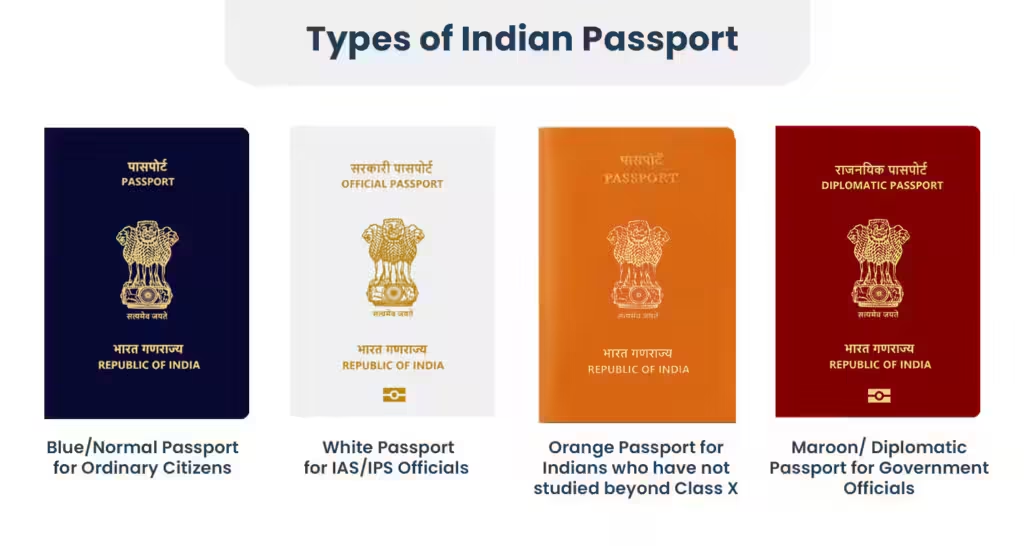The Indian government’s Ministry of External Affairs handles passport issuance for Indian citizens. These passports, regulated by the Passports Act of 1967, allow people to travel abroad and prove their Indian citizenship.
Different types of Indian passports exist, depending on a person’s job or situation. Let’s explore these various passport types used in India.
The different types of passports in India are as follows:
1. Ordinary Passport
The Ordinary Passport, also known as passport type P, is the standard travel document issued to regular Indian citizens who wish to travel abroad for business or leisure purposes. These passports are navy blue in color and are commonly used for business trips, vacations, and educational journeys.
Most Indians hold this type of passport, which serves the primary purpose of distinguishing ordinary citizens from government officials when traveling abroad. The blue color helps foreign authorities easily identify the official status of the passport holder.
Ordinary Passports contain essential personal details such as the traveler’s name, date of birth, and photographs. They also include other important identity information necessary for immigration purposes. These passports feature a simple and modern design.
2. White Passport
The White Passport, also known as a Type S passport, is regarded as the most authoritative passport available. Reserved exclusively for the government of India employees, it stands out as a symbol of their official capacity.
Distinct from the standard blue passport application process, obtaining a white passport involves additional procedures and regulations. Holders of white passports enjoy certain special privileges beyond those accorded to regular passport holders.
3. Diplomatic Passport
A Diplomatic Passport, also known as a Diplomat Passport, is specifically designated for diplomats and government employees who travel abroad on official business. These passports typically feature a white cover.
Only government officials are eligible for official passports, and diplomats and senior government officials are issued maroon passports. It’s important to distinguish between the maroon and white passport types.
Diplomatic passports are provided to government representatives planning international trips who do not already possess a white passport. They are primarily intended for individuals employed in the Indian Administrative Services and the Indian Police Service.
Holders of maroon passports enjoy numerous travel benefits. One significant advantage is exemption from visa requirements when traveling abroad. Regardless of the duration of their stay overseas, they are not required to obtain a visa. Additionally, these officials experience faster immigration processing compared to regular passport holders.
4. Orange Passport
The introduction of the Orange Passport in 2018 marked a significant change in the passports issued to Indian nationals. The government decided to discontinue printing the address page on Indian passports and instead introduced passports with an orange color scheme.
In terms of appearance, the new passport stands out with its distinctive orange hue and features easy-to-read pages, and a sleek design. Unlike the traditional stamp-based passports, these new ones were introduced to enhance the safety of citizens, particularly those with a lower level of education.
The introduction of the Orange Passport serves the purpose of aiding immigration and foreign personnel in identifying individuals who have completed education up to the 10th grade. It’s designed to protect those seeking employment opportunities abroad, reducing the risk of exploitation or scams.
This transition also aims to streamline the Emigration Check Required (ECR) verification and emigration process, potentially speeding up procedures. Notably, the name of the traveler’s father and the permanent address is not mentioned on the last page of an orange passport. Holders of this passport type are required to adhere to strict immigration regulations.
Below are the benefits and uses of having an Indian passport:
- Proof of Citizenship: An Indian passport serves as the primary document for establishing the holder’s citizenship.
- Proof of Identity and Residence: It also serves as a valid proof of identity and residence for various purposes.
- International Travel Record: The passport contains records of the holder’s international travel history.
- Visa-Free or Visa-on-Arrival Access: Indian passport holders enjoy visa-free or visa-on-arrival access to around 60 countries and territories, facilitating smoother travel experiences.
- Access to International Opportunities: Possessing an Indian passport opens doors to a variety of international internships and exchange programs, enhancing educational and career prospects.
- Consular Assistance: While traveling abroad, Indian passport holders can seek consular assistance from Indian embassies and consulates in case of emergencies or other issues.
- Visa Issuance: When planning a temporary stay in a foreign country, visas are issued and stamped in the passport, facilitating legal entry and stay.



